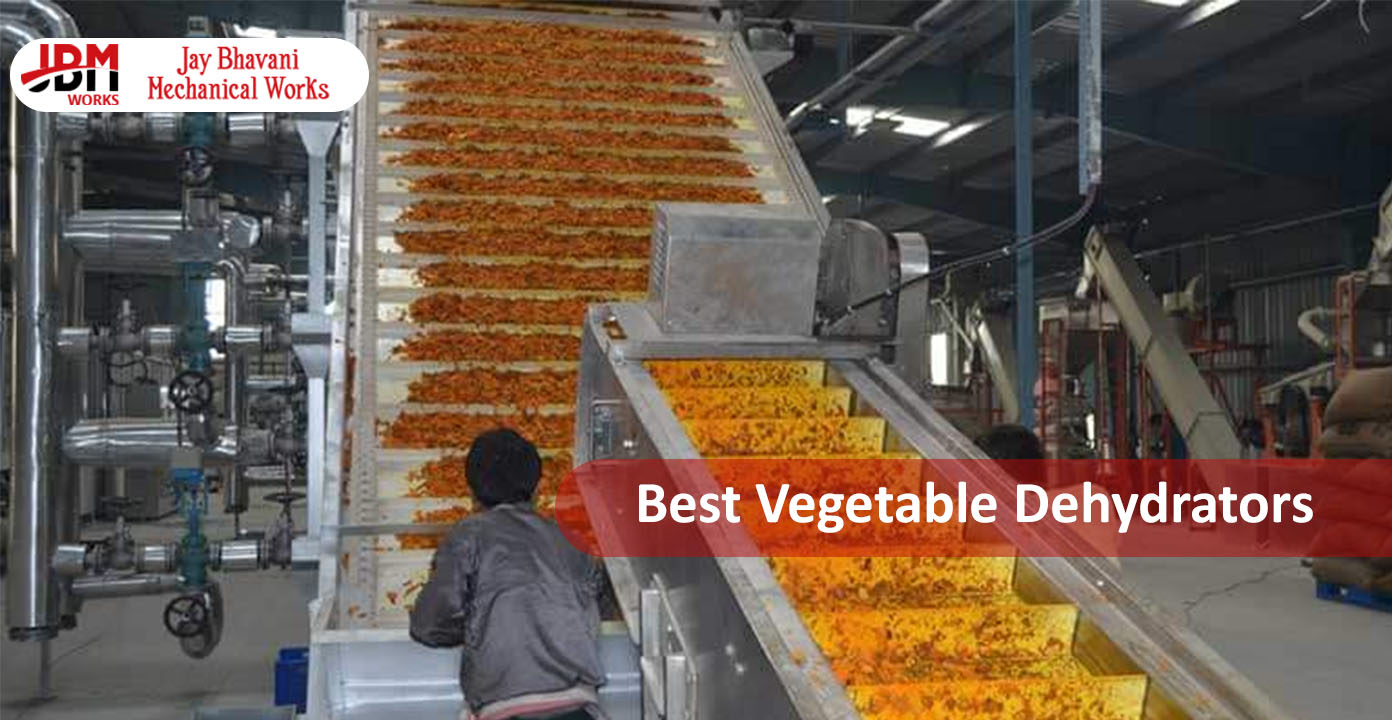Best Vegetable Dehydrators For Wholesaling, Trading, Industrial Applications
Dehydration solutions play a vital role in preserving fruits, vegetables, and other food products by effectively removing moisture while retaining their natural flavor, color, and nutrients. At Jay Bhavani Mechanical Works, we provide advanced dehydration systems designed for efficiency, hygiene, and long shelf life, making them ideal for food processors, exporters, and traders looking to add value and reduce waste.
About Jay Bhavani Mechanical Works
Established: 2002
Jay Bhavani Mechanical Works began with a vision to deliver top-notch dehydration solutions to clients across the globe. Over the years, we have grown, evolved, and perfected our craft, emerging as a trusted manufacturer and wholesale supplier of complete Dehydration Plants and Vegetable Dehydrators.
- Leadership: Mr. Jayesh Dhapa (two decades of industry experience)
- Manufacturing Location: Mahuva, Gujarat
- Business Type: Manufacturer, Wholesale Supplier / Wholesaler
- Major Markets Covered: India
Core Features
- Food-grade construction for hygienic processing
- Optimized airflow for uniform drying and color retention
- Digital temperature and time controls (model-dependent)
- Energy-efficient heating options (Electric / Gas / Steam / Solar-assisted)
- Easy cleaning and CIP-friendly designs (where applicable)
- Customizable capacities for batch or continuous production
Technical Specifications (Typical)
| Parameter |
Specification |
| Size / Dimensions |
Compact tabletop to large industrial footprints (customizable to layout) |
| Material of Construction |
Stainless Steel SS304 / SS316 (product contact parts) |
| Design / Type Variations |
Tray, Tunnel, Conveyor Belt, Solar-assisted, Hybrid |
| Capacity / Performance |
~50 kg/batch to 5000 kg/batch (batch) or 300–3000 kg/hour (continuous) |
| Heating Source |
Electric, Gas, Steam, Solar-assisted (as required) |
| Temperature Range |
Typically ambient to 80–90°C (product-dependent) |
| Controls |
Digital PID/PLC (optional data logging on select models) |
| Safety & Hygiene |
Food-grade gaskets, insulated panels, easy-wash interiors |
| Power |
Model-specific; optimized for energy efficiency |
Types / Variants Available
Our Products Models
| Type / Model |
Description |
Typical Capacity |
Heating |
Best For |
| Tray Type Dehydrator |
Multi-tray, batch drying with uniform airflow; compact to mid-size units |
50–500 kg per batch |
Electric / Gas / Steam |
Startups, MSMEs, specialty SKUs, pilot runs |
| Tunnel Type Dehydrator |
Insulated drying tunnel enabling larger batch/semicontinuous throughput |
500–5000 kg per batch |
Gas / Steam / Hybrid |
Bulk processors, exporters, integrated plants |
| Conveyor Belt Dehydrator |
Fully continuous, multi-pass belts for high throughput and consistency |
300–3000 kg per hour |
Gas / Steam / Electric (as required) |
Automation-first facilities, standardized products |
| Solar-Assisted Dehydrator |
Eco-friendly drying using solar gain with hybrid backup for reliability |
100–1000 kg per batch |
Solar + Electric/Steam backup |
Cost-sensitive operations, rural clusters, sustainability goals |
| Hybrid Custom Systems |
Tailored lines combining pre-treatment, drying, cooling, and packing |
Project-specific |
As engineered |
Turnkey plants and contract processors |
Use Cases by Type
Tray Type
- Seasonal vegetables (okra, bitter gourd, beans) in small batches
- R&D, product development, and market testing
Tunnel Type
- Bulk onions, carrots, potatoes, beetroot, leafy greens (pre-treated)
- Export volumes with consistent drying cycles
Conveyor Belt
- Continuous lines for diced/sliced vegetables and flakes
- When labor minimization and repeatability are priorities
Solar-Assisted
- Community clusters, farmer-producer organizations, sustainability projects
- Products needing gentle drying and energy cost control
Advantages / Benefits
- Extended shelf life without chemical preservatives
- Retention of nutrients, aroma, and natural color
- Lower storage and logistics costs due to reduced weight and volume
- Supports value-added lines (powders, flakes, instant mixes)
- Scalable from pilot to export-grade capacities
- Energy-efficient options to reduce OPEX
Buying Guide (Optional)
Key Factors Before Purchasing
- Capacity Planning: Match machine throughput to raw material availability and sales plan.
- Product Mix: Slices, dices, leafy greens, or powders may favor different dryer types.
- Heating Source: Electric for precision; Gas/Steam for lower energy cost; Solar for sustainability.
- Material & Hygiene: Prefer SS304/SS316 for food contact; easy cleaning design.
- Automation Level: Batch (manual) vs. continuous (automated) handling and controls.
- Footprint & Utilities: Check space, power, steam/gas line availability, and ventilation.
- Compliance: Food safety documentation and validation support as required.
Indicative Price Ranges
- Entry-level Tray Units: approx. ₹50,000 – ₹2.5 lakh (capacity and controls dependent)
- Industrial Batch/Tunnel Units: approx. ₹5 lakh – ₹50 lakh+
- Continuous Conveyor Lines: project-based pricing (throughput and automation level)
Note: Prices vary with capacity, materials, automation, and customization.
Maintenance Tips
- Clean trays, belts, and chambers after each production cycle
- Inspect and service fans, heaters, and airflow ducts periodically
- Lubricate moving components as per schedule (conveyor/tunnel)
- Operate within recommended load and temperature limits
- Plan annual professional servicing for industrial models
Why Choose Jay Bhavani Mechanical Works
- Over two decades of hands-on dehydration expertise
- Modern manufacturing base in Mahuva, Gujarat
- Comprehensive range from compact trays to turnkey lines
- Customization and process optimization support
- Reliable after-sales service and spares
- Competitive wholesale pricing for traders and exporters
Company Information
| Business Type |
Manufacturer, Wholesale Supplier / Wholesaler |
| Year of ESTD |
2002 |
| Major Markets Covered |
India |
| Head / Mentor |
Mr. Jayesh Dhapa |
| Manufacturing Location |
Mahuva, Gujarat |
FAQs
Which dehydrator type should I choose?
Choose Tray for small batches and flexibility, Tunnel for larger batches, Conveyor for continuous high throughput, and Solar-assisted for eco-friendly, cost-sensitive operations.
Can systems be customized?
Yes. Capacities, materials, heating sources, controls, and layout can be tailored to project needs.
What vegetables can be processed?
Onion, garlic, carrot, okra, beans, beetroot, peas, leafy greens (pre-treated), mixed vegetables, and more.
Contact & Enquiries
To request a quotation or a technical consultation, please share your target capacities, product mix, preferred heating source, and site utilities. Our team will propose the most suitable model and configuration.
